
It’s not the works of Poe or Dickinson that inspires young poets now – it’s Instagram posts and the lyrics of hip-hop artists
 17 year-old Aniyah Smith is Washington DC's youth poet laureate and wants her voice to matter.
17 year-old Aniyah Smith is Washington DC's youth poet laureate and wants her voice to matter.Forget William Shakespeare, Edgar Allan Poe, or Emily Dickinson – young people nowadays are creating their own poetry.
To mark National Poetry Month, The Washington Post talked to several poets in the US about why poetry is so important for youths.
“I’m seeing [poetry] not be something that is only available to you if you are taught about it in school,” said Aniyah Smith, 17, Washington DC’s youth poet laureate, an honour given to a Washington-area poet between the ages of 14 and 19.
It’s not that young people want to ignore the works of Shakespeare or Poe. They simply want to talk about today’s issues, such as gun violence and race relations.
“I think that poetry is the most powerful tool currently. As a young woman of colour, I am often told to be quiet. I’m often told my voice doesn’t matter,” Aniyah said. “As young people in the poetry scene, we are using our words as a protest to a country that is kind of rendering us voiceless.”
Established poets welcome this younger generation using poetry to highlight the issues of today.
Nikki Giovanni, who began publishing poetry in the 1960s, has had poets of all ages seek her wisdom. She has written many poems about race, but Giovanni says it’s not her place to tell people what to write about.
“What I dislike is the people around my age who say things like, ‘Oh, that’s wrong’, because we heard all of that when we were growing up – ‘Oh, y’all don’t know what you’re doing’,” Giovanni said.
Giovanni is often considered a living legend in the poetry world, but she sees herself as just one contributor to the form’s growth.
“I don’t know where the kids are going to go with it; [older people] will be watching where they’re taking poetry and how they’re using it – and it will always be with us,” Giovanni said. “Poetry is going to continue to find a way to fit into whatever this community is. That’s what poetry does and [what] makes it so wonderful.”
One person who understands Giovanni’s impact more than most is her former student Kwame Alexander, author of the award-winning The Crossover and its new prequel, Rebound.
Giovanni was Alexander’s professor at Virginia Tech in the US state of Virginia, and the two are close friends. Both use poetry in inventive ways to tell stories for children, and they want to make sure that the concerns of young people are taken seriously.
“Kids are smart, and in many instances, they are smarter than we think they are and more aware of what’s happening in the world – they just have a lot of questions,” Alexander said. “I think with poetry, we have the capacity to ask those questions, to do it in a way where a kid can understand it, can be able to have some more insight and ultimately can feel a little bit empowered about all the things they’ve already been thinking.”
It’s not just poetry books that are trying to answer those questions. Kids are finding poems on social media platforms such as Instagram. They also might be introduced to the idea of poetry through hip-hop or rap music.
Alexander says these are good entry points to poetry, but they won’t be as meaningful as reading the works of Giovanni or Pablo Neruda.
“Any supplementary resources that are available to excite kids or excite readers around poetry is all good,” Alexander said. “But it’s sort of like you go to an amusement park, you got candyfloss, popcorn, peanuts, games and arcades – all these things that are cool and support the amusement park – but everybody’s coming for the roller coaster.”
Aniyah strongly believes that these paths to poetry will spark more interest in the art form.
“I think it’s giving young people the opportunity to see poets that look like them. Because when you put something on Instagram, there’s no one to tell you, ‘You can’t’,” Aniyah said. “You are your own megaphone, you’re your own microphone, and you’re putting your own voice out there.”
Edited by Ginny Wong